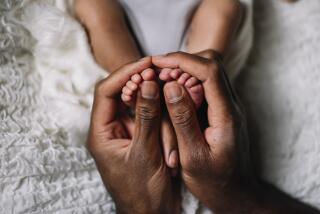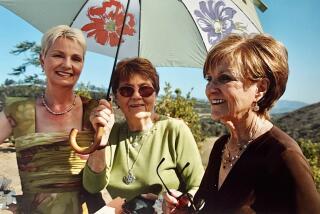From the Archives: A Mother’s Fading Dream
- Share via
AIGO...DAE-YONG-ah, WHERE ARE YOU? WHERE DID YOU GO? ARE YOU ALIVE OR DEAD?
For nearly half a century, my grandmother has been searching for answers to these painful questions. For all my life, I have heard these mournful words--words that have been permanently engraved in my mind, a memory of my grandmother’s suffering.
In 1950, at the onset of the Korean War, my uncle--my grandmother’s eldest son--returned to school in Seoul after visiting his family. Soon after, the war escalated and my family lost contact with him.
My uncle had vanished.
But my grandmother, who emigrated to Los Angeles in 1976, never lost hope that her son was living. Somewhere.
Her 41-year search for him has been ceaseless. Always, her efforts turned up nothing new. And many times she was told to give up--her son was missing and presumed dead.
Until last month.
That was when my grandmother received a letter from her long-lost son. To our great surprise, Uncle Kang Dae-Yong had been in North Korea all these years. Immediately, we started making plans for my grandmother’s trip to visit him. She began shopping for gifts. Every day, she carried around a cordless phone--just in case he should call.
But soon, all the preparations came to a halt.
My grandmother is now in a coma at the hospital. She suffered a stroke two weeks after receiving my uncle’s letter. She is oblivious to my family’s around-the-clock vigil, three generations of children at her bedside wondering if she will ever fulfill her life’s dream.
My grandmother, Haeng-Ok Kang, 80, is a great storyteller.
Before I even learned to read and write, she used to tell me stories about my uncle--my father’s older brother--and my grandfather.
Many times a day, with her head bent over a sewing machine in Kochang--my home village in Cholla Province in southwest Korea--my grandmother would reminisce about her life, which included terrible memories of the Korean War.
The war robbed my grandmother of the two most important men in her life: her husband and her mat-adul (oldest son). My grandfather, a civilian, was killed in the war. My uncle, who would have become the family patriarch, disappeared. The loss of these men--the pillars of the Kang clan--brought much hardship to my grandmother, then 39. She had to become the breadwinner for her five other children, who ranged in age from 1 to 15.
In the summertime, my grandmother toiled in the fields, rice farming in the sweltering heat. During the blistering winter months she prepared the same field and planted barley for the spring. And always, in the evenings, she sat hunched over a machine, sewing clothes for the children of the village to supplement the family’s income.
My grandmother raised her children and, in keeping with tradition, made sure that they all married and began families of their own. She also was the catalyst for our decision to immigrate to America in the mid-1970s in search of a better life.
I grew up with no music in the house, because it reminds my grandmother of her son. My Uncle Dae-Yong loved music. He played guitar, organ and piano. He loved to sing.
During our childhood, my two brothers, sister and I never listened to the radio, sang or learned to play an instrument. We respected my grandmother’s feelings and, no matter how happy the occasion, the sounds of music were absent at family events.
“Even on my wedding day, we had no music,” recalls my aunt Haeng-Ja. In fact, my grandmother cried on the wedding nights of each of her children. Says my aunt: “Grandma cried after everyone fell asleep, lamenting the cruel fate that deprived her of her husband and mat-adul to share joyous occasions.”
To find her son, my grandmother spent years in Korea and America contacting government officials, refugee camps and war veterans. No one knew anything about him.
Last December, her hopes were renewed. She had watched a Korean-American TV program on which a minister was asking for information from local families about relatives missing in the war.
My grandmother immediately mailed the information. Earlier this year, the pastor met with North Korean authorities about her case and hundreds of others.
My uncle’s letter was a result of his efforts.
On June 7, the day the letter arrived, my grandmother cried until her eyes turned red and swollen. Her first moments were spent reading and rereading her son’s handwriting until she memorized the sentences. My uncle had sent my grandmother a thumb-sized photograph of himself that I enlarged to an 8-by-10 glossy and framed. The photo never left her side. She walked around the house with it and placed it by her bed at night.
My grandmother’s sleepless nights began soon after the first letter arrived, her thoughts centered on her reunion with her son and his family.
Uncle Dae-Yong wrote that he had been studying in Seoul when he was drafted into the North Korean People’s Liberation Army at age 18. After the cease-fire in 1953, he completed his education at Kim Il Sung University in Pyongyang, the capital of North Korea.
Now, at 59, he has worked for the government for 30 years and has a wife, and, as grandmother said, “I have five more grandchildren that I didn’t raise by myself.”
Inside my grandmother’s large bedroom in Hancock Park, two suitcases were packed, ready for her trip to see her son. “I hear North Korea is like our 1960s in South Korea,” she said, referring to the lack of modern-day conveniences. “Nail clippers were scarce and very precious then. . . .”
She packed two boxes of 20 nail clippers that she purchased in Koreatown. When I asked her why she bought so many, my grandmother replied, “I want my mat-adul to be able to share gifts from his mother in America with his friends.”
She also packed several sport coats and men’s suits for her four grandsons, who are close to my age, in their 20s. In his letter, Uncle Dae-Yong wrote that he had recently told his friends that his mother would be around 80 years old, if she were still alive. Coincidentally, the next day he received the news about his mother living in America.
“My friends all congratulated me and told me I should treat them,” he wrote, referring to a celebration he owes his friends.
My Aunt Haeng-Ja recalls reading that part of the letter to my grandmother. “Grandmother wanted to personally treat her son’s friends and told me to get 15 neckties,” my aunt says. “She was so happy when I told her I bought 15 neckties.”
My grandmother hasn’t seen the ties. She collapsed the night before my aunt had promised to bring by the ties. Shortly after midnight, she walked into my uncle’s bedroom complaining about a pain in the head. Then she fell into his arms, losing consciousness. She was rushed to the hospital.
Since her hospitalization, I’ve played in my mind over and over again conversations I recently shared with my grandmother.
Several times she had asked me to go with her to North Korea. Lately, that’s all she thought about: the reunion with her son. She couldn’t sleep at night. During the days, she packed and repacked gifts ranging from undergarments for her grandchildren to blouses and lingerie for her granddaughter and daughter-in-law.
My grandmother even canceled a trip to South Korea to visit her sisters, which she had planned for more than a year. “I’ve got to save up my energy to go see my mat-adul ,” she said.
My grandma’s life epitomizes that of many Korean women of her generation. She has lived through harsh decades of Japanese colonialism, the Korean War and the turbulence that followed. In search of a better life, she came to America in 1976. I remember seeing her cry at the thought of leaving Korea forever, of leaving her beloved homeland, where her ancestors have lived for thousands of years. She also was torn by the thought of leaving behind her lost son.
“Who’s going to be here to greet him when he returns?” she asked. “All living things return home sometime. If he is remotely alive, he is bound to come home. Who’s going to be here for him?”
My family, including 15 grandchildren, continues a vigil at my grandmother’s bedside. Shortly after she went in the hospital, we had a family meeting. We decided that because grandmother had given her whole life for us, the least we could do was each spend a few hours each day with her.
We massage her legs and arms. We talk to her. We remind her about the reunion with my Uncle Dae-Yong.
In her hospital room, I’ve told her about the idle moments when she used to lament the fate of the Korean people and her own family.
“What kind of fate were we born with that we couldn’t have our grandfather and uncle here with us?” she would often ask.
In recent years, as her health became more frail, she began to talk more and more about her mat-adul as if he were listening: “I’m old and at the threshold of death, son. What has happened to you? Are you alive? Are you still with us in this world?”
On the day before she was rushed to the hospital, she went to a Koreatown beauty parlor. She told me she had wanted to get her hair done “just before going to visit my mat-adul . But my head felt so heavy that I thought getting a haircut would clear the head.”
Doctors seem to have given up hope that my grandmother will regain consciousness. But I want to think otherwise. I cannot help but remember the the last chat my grandmother had with her close friend, Mrs. Chin. “I am going to live to see my son,” she told her. “I am not going to die before I see my son.”
Kang is a former Los Angeles Times photographer
More to Read
Start your day right
Sign up for Essential California for the L.A. Times biggest news, features and recommendations in your inbox six days a week.
You may occasionally receive promotional content from the Los Angeles Times.






